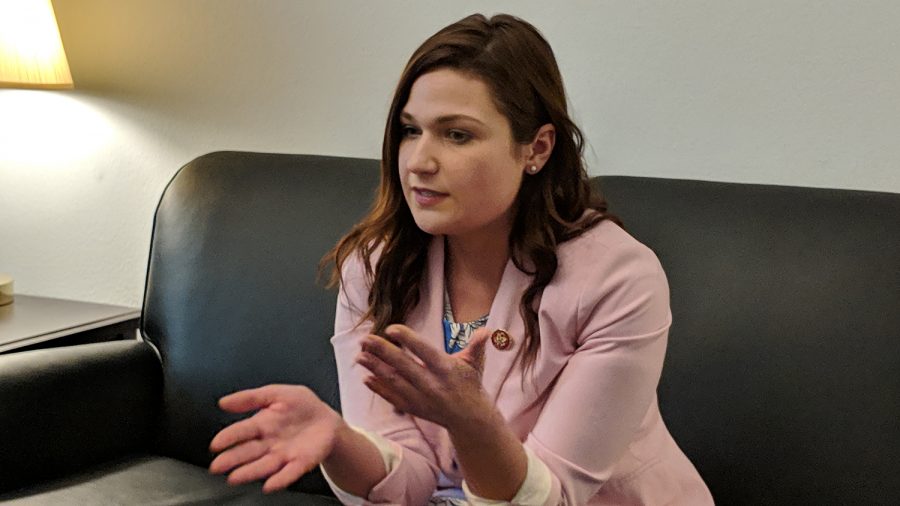Climate change, Midwest floods divide politicians
Members of Iowa’s congressional delegation are split on using flooding in Iowa to address climate change.
Rep. Abby Finkenauer, D-Iowa, speaks in her office in Washington, D.C., on Wednesday.
March 29, 2019
As major flooding continues in the counties of western Iowa and Nebraska, some Democrats are pointing to climate change as the cause of the damage and pushing for Congress to address it.
Rep. Alexandria Ocasio-Cortez, D-N.Y., used the Midwest flood in a statement she made on the U.S. House floor this week when responding to comments from Republicans who called environmental issues “elitist.”
“Iowa, Nebraska, broad swaths of the Midwest are drowning right now, underwater,” Ocasio-Cortez said on Tuesday. “Farms, towns, that will never be recovered and never come back.”
Rep. Abby Finkenauer, D-Iowa, said she thinks the flooding and climate change are related, and she’s glad that people are addressing the issue of climate change.
“[Climate change is] a cause whether it’s wildfires in California or heavy snowfall or even changing to earlier winters and cutting down on harvest season,” she said in an interview March 27 with The Daily Iowan.
Finkenauer hopes to see discussions about lawmakers taking climate change seriously and address it in a way that makes sense for Iowa and for the U.S., she said.
“Obviously, it’s all related [climate change and flooding], and it’s stuff we should be talking about, and I’m glad we are talking about it,” Finkenauer said. “I’m proud that Iowa has always led the way on making sure that we are addressing the issue.”
Ocasio-Cortez champions the Green New Deal, a proposal that aims to create jobs and enact legislation that would create stricter environmental legislation. While Finkenauer supports addressing climate change, the Des Moines Register previously reported she does not specifically support the Green New Deal.
The flooding on the Missouri River watershed began March 12 and caused Iowa Gov. Kim Reynolds to declare a state of emergency for 57 Iowa counties. Approximately 250 miles of Iowa levees will need $525 million worth of repairs.
The flooding in Iowa, Nebraska, Minnesota, and Missouri was caused by a long winter and rapid snow melt combined with heavy rain, especially where soil moisture was high, according to the National Oceanic and Atmospheric Administration.
NOAA also reported that flooding could become more widespread in states south of Iowa as snow melt and heavy rains continue and the excess water flows through river basins. The upper part of the Mississippi River, where Iowa is located, received 200 percent more rain and snow than what is considered average.
U.S. scientists report that climate change has a “supporting role” in the extreme flooding, according to a report from Reuters. The Associated Press reported that it could take weeks for scientists to determine if the sole cause of flooding was climate change, but scientists agree that climate change is making natural disasters more frequent and last longer.
In an email from Michael Zona, the press secretary for Sen. Chuck Grassley, R-Iowa, he wrote that there is not a lot of evidence to support that the flooding and climate change are related. “Adverse weather and poor management of the river are primarily at fault,” Zona wrote.
Grassley voted against the Green New Deal resolution on Tuesday. He said in an interview with the DI that he disagrees with some of the economic policy in the Green New Deal resolution, saying that it aims to “socialize the economy.”
He said action to address environmental concerns and global warming has been underway for the last 30 years, touting Iowa’s contribution in using wind and solar energy.






